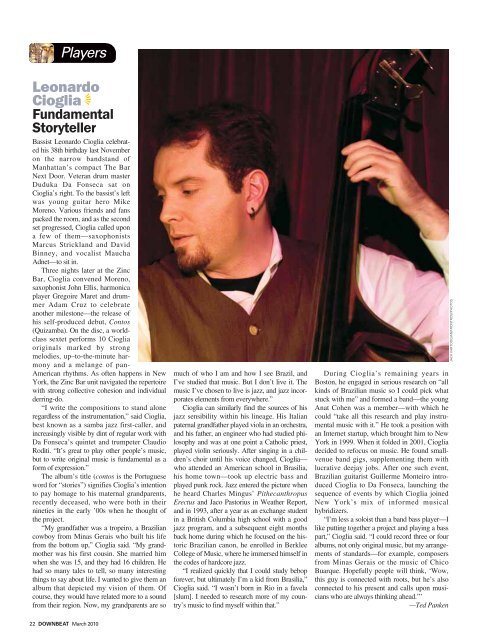Download - Downbeat
Download - Downbeat
Download - Downbeat
Create successful ePaper yourself
Turn your PDF publications into a flip-book with our unique Google optimized e-Paper software.
Players<br />
Leonardo<br />
Cioglia ;<br />
Fundamental<br />
Storyteller<br />
Bassist Leonardo Cioglia celebrated<br />
his 38th birthday last November<br />
on the narrow bandstand of<br />
Manhattan’s compact The Bar<br />
Next Door. Veteran drum master<br />
Duduka Da Fonseca sat on<br />
Cioglia’s right. To the bassist’s left<br />
was young guitar hero Mike<br />
Moreno. Various friends and fans<br />
packed the room, and as the second<br />
set progressed, Cioglia called upon<br />
a few of them—saxophonists<br />
Marcus Strickland and David<br />
Binney, and vocalist Maucha<br />
Adnet—to sit in.<br />
Three nights later at the Zinc<br />
Bar, Cioglia convened Moreno,<br />
saxophonist John Ellis, harmonica<br />
player Gregoire Maret and drummer<br />
Adam Cruz to celebrate<br />
another milestone—the release of<br />
his self-produced debut, Contos<br />
(Quizamba). On the disc, a worldclass<br />
sextet performs 10 Cioglia<br />
originals marked by strong<br />
melodies, up–to-the-minute harmony<br />
and a melange of pan-<br />
American rhythms. As often happens in New<br />
York, the Zinc Bar unit navigated the repertoire<br />
with strong collective cohesion and individual<br />
derring-do.<br />
“I write the compositions to stand alone<br />
regardless of the instrumentation,” said Cioglia,<br />
best known as a samba jazz first-caller, and<br />
increasingly visible by dint of regular work with<br />
Da Fonseca’s quintet and trumpeter Claudio<br />
Roditi. “It’s great to play other people’s music,<br />
but to write original music is fundamental as a<br />
form of expression.”<br />
The album’s title (contos is the Portuguese<br />
word for “stories”) signifies Cioglia’s intention<br />
to pay homage to his maternal grandparents,<br />
recently deceased, who were both in their<br />
nineties in the early ’00s when he thought of<br />
the project.<br />
“My grandfather was a tropeiro, a Brazilian<br />
cowboy from Minas Gerais who built his life<br />
from the bottom up,” Cioglia said. “My grandmother<br />
was his first cousin. She married him<br />
when she was 15, and they had 16 children. He<br />
had so many tales to tell, so many interesting<br />
things to say about life. I wanted to give them an<br />
album that depicted my vision of them. Of<br />
course, they would have related more to a sound<br />
from their region. Now, my grandparents are so<br />
much of who I am and how I see Brazil, and<br />
I’ve studied that music. But I don’t live it. The<br />
music I’ve chosen to live is jazz, and jazz incorporates<br />
elements from everywhere.”<br />
Cioglia can similarly find the sources of his<br />
jazz sensibility within his lineage. His Italian<br />
paternal grandfather played viola in an orchestra,<br />
and his father, an engineer who had studied philosophy<br />
and was at one point a Catholic priest,<br />
played violin seriously. After singing in a children’s<br />
choir until his voice changed, Cioglia—<br />
who attended an American school in Brasilia,<br />
his home town—took up electric bass and<br />
played punk rock. Jazz entered the picture when<br />
he heard Charles Mingus’ Pithecanthropus<br />
Erectus and Jaco Pastorius in Weather Report,<br />
and in 1993, after a year as an exchange student<br />
in a British Columbia high school with a good<br />
jazz program, and a subsequent eight months<br />
back home during which he focused on the historic<br />
Brazilian canon, he enrolled in Berklee<br />
College of Music, where he immersed himself in<br />
the codes of hardcore jazz.<br />
“I realized quickly that I could study bebop<br />
forever, but ultimately I’m a kid from Brasilia,”<br />
Cioglia said. “I wasn’t born in Rio in a favela<br />
[slum]. I needed to research more of my country’s<br />
music to find myself within that.”<br />
During Cioglia’s remaining years in<br />
Boston, he engaged in serious research on “all<br />
kinds of Brazilian music so I could pick what<br />
stuck with me” and formed a band—the young<br />
Anat Cohen was a member—with which he<br />
could “take all this research and play instrumental<br />
music with it.” He took a position with<br />
an Internet startup, which brought him to New<br />
York in 1999. When it folded in 2001, Cioglia<br />
decided to refocus on music. He found smallvenue<br />
band gigs, supplementing them with<br />
lucrative deejay jobs. After one such event,<br />
Brazilian guitarist Guillerme Monteiro introduced<br />
Cioglia to Da Fonseca, launching the<br />
sequence of events by which Cioglia joined<br />
New York’s mix of informed musical<br />
hybridizers.<br />
“I’m less a soloist than a band bass player—I<br />
like putting together a project and playing a bass<br />
part,” Cioglia said. “I could record three or four<br />
albums, not only original music, but my arrangements<br />
of standards—for example, composers<br />
from Minas Gerais or the music of Chico<br />
Buarque. Hopefully people will think, ‘Wow,<br />
this guy is connected with roots, but he’s also<br />
connected to his present and calls upon musicians<br />
who are always thinking ahead.’”<br />
—Ted Panken<br />
JACK VARTOOGIAN/FRONTROWPHOTOS<br />
22 DOWNBEAT March 2010
















